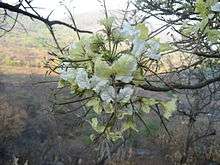Cladostemon
| Three-finger bush | |
|---|---|
 | |
| Scientific classification | |
| Kingdom: | Plantae |
| (unranked): | Angiosperms |
| (unranked): | Eudicots |
| (unranked): | Rosids |
| Order: | Brassicales |
| Family: | Capparaceae |
| Genus: | Cladostemon |
| Species: | C. kirkii |
| Binomial name | |
| Cladostemon kirkii (Oliv.) Pax & Gilg | |
Cladostemon kirkii (klados - a branch, stemon - a stamen), commonly known as the Three-finger bush, is a small deciduous tree belonging to the Capparaceae or caper family. It is a genus that has only this one species (monotypic). It is distributed through Kenya, Tanzania, Malawi, Mozambique, Zambia, Zimbabwe, Swaziland and KwaZulu-Natal in Southern Africa.
The species is named after Sir John Kirk (1832-1922), David Livingstone's companion on his Zambezi expedition of 1858 and the first European collector of the plant near Tete in Mozambique.[1]
Description
Cladostemon kirki has leaves that are trifoliolate with obovate leaflets that are glabrous with a thin texture and a common petiole up to 200 mm long. Twigs and branches are flexible and herbaceous.
The fragrant inflorescences are terminal or axillary, greenish at first, then white with pink venation, and finally turn yellow with age. The individual flowers are asymmetric, the two upper petals being much larger than the lower. The 15 cm long stamens are fused for most of their length, forming an androphore.
The large pendulous fruits are gourd-shaped, have a leathery texture and are up to 12 cm in diameter, hang from long, thick, sharply bent, jointed stalks, and give off an odour repulsive to humans on being picked.

Distribution
This tree is found in bushveld and sand forest, in open woodland and scrub, preferring sandy soils in hot areas. The animals pollinating this species' flowers are as yet unknown, while the large size of the fruit suggests eating and dispersal by a large animal such as elephant, rhino or buffalo.[2]
Flowering Plants of Africa, vol. 52, plate no. 2079, from a specimen collected by Elsa Pooley in 1991 at the St. Lucia Estuary, illustrates the species well and may be seen here.
See also
| Wikimedia Commons has media related to Cladostemon kirkii. |